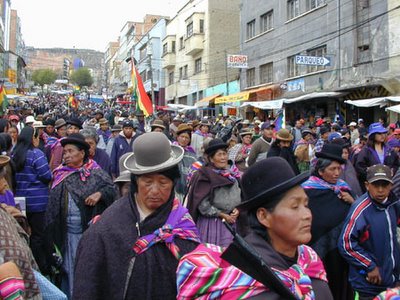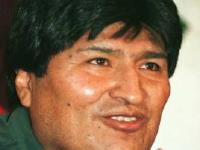
It means that the US will now be at war with all of Latin America, even as it remains entangled in a Southwest Asian energy war.
Evo Morales, who leads the MAS (Movement Toward Socialism) in majority-indigenous Bolivia, and has long represented the indigenous coca growers of that landlocked nation, himself an Aymara speaking indigenous person from the Altiplano who herded llamas as a child, will be the next president of Bolivia.

Che Guevara, who was killed in Bolivia by the CIA and the Bolivian army in 1967, must be smiling. This election is merely the latest act in what began as an open rebellion against US and multinational depredations on Bolivian resources and labor that shut down cities and toppled governments.

"The Bolivian people have made history. Never have they directly elected their President with more than 50% of the vote; no candidate has even reached 37%. But today, blowing away all polls and projections that placed his support around 35%, Evo Morales Ayma has officially won the Presidential election with over 50% of the popular vote and will head the next government of Bolivia. Scattered accounts of this monumental event are below."
-Jean Friedsky, "Election Day in Bolivia 2005: A View from the Chapare and Cochabamba," December 19, 2005
This development is the latest in a series of staggering setbacks for US imperialism in Latin America. Earlier this month, socialist Michelle Bachelet became the first woman to preside over Chile. Argentina's President neo-Peronist Kirchner and Brazil's left-center de Silva both just declared that they would pay down the principle on their IMF debt, cutting their dependency on the US-controlled international loan shark, and allowing them to break away from the IMF's devastating structural adjustment programs. In November, 2004, Tabare Vazquez was elected the first leftist leader of Uruguay. In 2002, oil-rich Venezuela was subjected to a coup d'etat against the elected government of Hugo Chavez, supported by the US; which was reversed in two days by a popular uprising which included most of the Venezuelan military.
National sovereignty and self-determination are trying to break out in Latin America. These are not merely insider political maneuvers, but leaders who are serving as the representatives of highly mobilized, highly militant popular movements. these leaders are getting more pressure from their majority-left than from the minority, well-financed, US-supported comprador bourgeoisies and their truckling technocrats. And make no mistake about it. This will be contagious.
The two dimensions of this historic continental drift are (1) the increasing vulnerability of the US, dipolmatically ever more isolated, financially ever more exposed, economically ever more precariously perched on a huge debt overhang, politically in a malaise from corruption and a security-state overreach, and militarily trapped in the tar-baby of Iraq, and (2) the organizing role of Venezuela in the region.
Let there be no doubt about this: the war that is now breaking out between the US and Latin America is not just a continuation of US neo-colonial control for labor and markets — it is part and parcel of the global Energy War.
Diego Mantilla, in "Chavez, Mercosur, the pipeline and oil" (December 11, 2005), explains:
"As Western Hemisphere energy resources become increasingly scarce, competition for access is bound to create geopolitical tension. The latest example of this trend is the overture made by Venezuelan President Hugo Chavez towards Mercosur, the free trade area made up of Brazil, Uruguay, Paraguay and Argentina.
"Venezuela's accession to Mercosur would combine nicely with attempts by Venezuela and Argentina to connect their energy markets via a pipeline laid across the South American continent.
"President Chavez and Argentinian President Nestor Kirchner met in November to discuss the pipeline. The AP reported that 'the cost for a pipeline running south through Brazil to Argentina has been estimated at $10 billion.'
"If the pipeline is completed, Venezuela could help Argentina overcome an expected energy shortage during the coming years as the natural gas reserves of the Southern Cone come under pressure of the growing needs of its population. According to The Economist, 'Venezuela could become the hub of a regional energy network.' Venezuela already helped Argentina meet its energy demand last year by shipping diesel, The Economist reported."
Not only has Chavez been instrumental in the development of MERCOSUR, the regional trade bloc designed to "bury" the US Free Trade of the Americas agreement -- another predatory NAFTA-like pact that allows US multinationals to rape less developed countries, Chavez recenlty set up a Venezuelan hedge fund that is buying up hundreds of millions of dollars of regional debt without the structural adjustment strings of IMF loans. This was possible because rising oil prices have left the Venezuelan treasury flush.
This strategic challenge to US power in the region is further facilitated by US dependence on Venezuelan oil. A critical margin of 15% of US oil imports comes from Venezuela. Bolivia, too, is sitting atop combustible hydrocarbons — including 48.7 billion cubic feet of natural gas that Morales has promised to nationalize. The technocrats are threatening to "strike," as they attempted in Venezuela to prepare the coup, but there is as wild card named China that is cutting deals for energy development in Latin America, and China has no interest in perpetuating exteranl debts to keep Wall Street's boot on Bolivia's neck. And of course... there is Venezuela.
The other half of Energy War, aside from Energy, is War. Evo Morales came to prominence as a cocalero, a coca grower, who organized other indigenous coca growers to fight against the US-directed, so-called War on Drugs, which became the excuse to expand US military presence and patronage throughout the region, as wellas use coca eradication as a method to depopulate rural areas and make land availabe to investors. When the US military base at Vieques Island, Puerto Rico was closed in the face of miltiant nationalist pressure in 2003, that sense of nation against empire never went away; and Puerto Rican nationalism is on the rise. If Morales throws the US military our of Bolivia and manages to gain the loyatly and support of his own military, as the armed expression of Bolivian national identity, this is another spor that will be carried on the winds throughout Latin America, and even beyond.
(An international campaign to shut down US military bases abroad could not find a better time than now. Perhaps in Incirluk, Turkey, for starters, since Turkey was only behind Brazil in terms of its IMF debt load, and it is suffereing exactly like Latin America from the US/IMF system of dollar hegemony and "structural adjustment." When Brazil pays its debt this year, Turkey will be number one under the heel of the IMF.)
Expect savage opposition to Morales, as there is against Cuba, Venezuela, the Colombian revolutionaries, and anyone else who dares assert their sovereignty against the US Imperium. But this is not Iraq, where an election has to be tweaked and re-tweaked to forge a "friendly" result (even though that WILL fail ultimately). The election of Morales was the last act, not the first, after years of struggle and organization and escalating militancy outside the electoral arena. Chavez is organizing the population to defned itself, just as Fidel Castro did against the invasion at Playa Giron (Bay of Pigs). Morales may consider the same.
The war has already started. There is no turning back. The Latin American masses are awake. We have to be awake, and be prepared to fight for them politically here.
The tip of another tentacle was cut yesterday. It is a time to celebrate, for a moment, then sigue la lucha.
Adelante!
